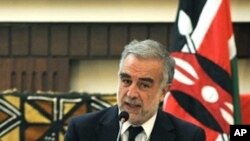Kenyans are anxiously waiting for suspects to be named in the International Criminal Court's landmark investigation into the country's post-election chaos. But as prosecutor Luis Moreno-Ocampo prepares to present his case to The Hague, setbacks and criticism in Kenya threaten to derail the trial.
There are less than two weeks left until Prosecutor Moreno-Ocampo's indictment deadline of December 17 expires and Kenyans across the nation are waiting to see which among the country's political and business elite will be named.
But more than a few observers in Kenya are now wondering whether or not the prosecutor's case will stick. There have been several legal challenges since the beginning of the investigation in March, and the most recent will see Mr. Ocampo present his case without crucial testimony from Kenya's police.
On Tuesday, Kenyan Justice Kalpana Rawal again postponed scheduled testimony from police officials, after they issued an official request to the ICC for immunity from prosecution for their statements. Rawal was clearly frustrated in making the decision, and called into question the last-minute timing of the request.
The prosecutor has stated on multiple occasions that his only targets in the violence probe were those deemed "most responsible for the violence." Last week in Nairobi he directly dismissed police fears they would be used as a scapegoat.
"We are working with Lady Justice Rawal to interview some police officers. They are not - they are not - under investigation. They are called as witnesses," he said.
But the security chiefs are not convinced. Required to cooperate with the ICC investigation under Kenyan law, they successfully delayed their testimony after arguing that a Kenyan judge should be the one to take the statements. After Justice Rawal was appointed, police officials again stalled proceedings, demanding their questions be given in advance of the testimony.
In Tuesday's ruling, Rawal said testimony would resume by December 20. Prosecutor Moreno-Ocampo last week promised to present his case before the 17th, meaning he will be without the testimony of the security chiefs.
Local investigations into the post-election violence in 2007 and 2008 found the Kenyan police played a critical role in allowing the violence to spread and, in some cases, the killing itself. Perhaps their most important function is helping to establish the veracity of alleged "shoot-to-kill" orders issued by senior members of the Kenyan government.
Also plaguing the ICC process are allegations from Kenyan politicians the indictments have been designed to affect the outcome of the 2012 presidential elections. Chief among these politicians is former Higher Education Minister William Ruto.
Ruto is one of the dominant political forces in Kenya's Rift Valley, where much of the post-election violence took place. He recently revealed himself to be a suspect in Moreno-Ocampo's investigation and has hit back against his critics during the past month, accusing many, including the Kenya National Commission on Human Rights of falsifying evidence against him.
Kenyan Vice-President Kalonzo Musyoka stood by Ruto at a rally over the weekend. Musyoka told supporters that certain people were determined to see Ruto "sink" before the 2012 election.
On Tuesday, the European Union's chief diplomat in Nairobi Eric Van Der Linden defended the ICC investigation and warned politicians against inflammatory statements.
"The ICC process is an independent legal process. Politicians should resist attempts to politicize and ethnicize the process," he said.
More than 1,000 people were killed and more than 300,000 displaced after the disputed 2007 presidential election. President Mwai Kibaki and Prime Minister Raila Odinga accused one-another of fraud after the vote, setting off two months of ethnic violence countrywide.
Despite the criticisms and allegations being thrown at him, Prosecutor Moreno-Ocampo has assured Kenyans he has enough evidence to prosecute six high-profile Kenyans in two separate cases. He says he will target the masterminds of the violence.
What remains to be seen is how Kenya's leaders react when the suspects are revealed. Both President Kibaki and Prime Minister Odinga have pledged their full support for the ICC and for now the Court's detractors are on the outside looking in.




